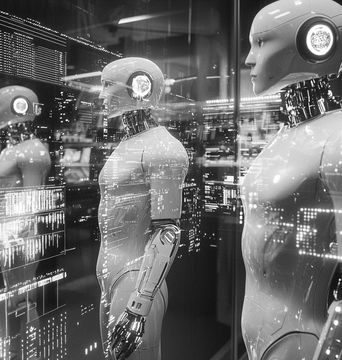AI COMPANIES RACE TO PROFIT FROM AUTONOMOUS 'AGENTS' AMID CONCERNS OF TRUST AND CAPABILITY

The tech world is buzzing with innovation, with Microsoft, Google, and other tech giants focusing their efforts on developing AI agents - autonomous programs that make decisions and interact with environments with little to no human input. More adept than simple bots, these AI agents leverage machine learning techniques to adapt and make decisions independently. Despite concerns raised about potential misuse, the investment flooding into AI agent startups is a clear sign of the direction in which the tech market is headed.
Imagine an efficient colleague that can handle simple tasks instantly or tackle complex tasks patiently with questions when necessary. That's how OpenAI CEO Sam Altman envisions the role of AI in the future workplace, swooping in to handle customer service and administrative tasks proficiently.
AI companies, hoping to monetize these powerful AI models, have enjoyed an influx of venture capital. The goal is to delegate routine tasks, such as making purchases or booking travel, to AI agents. This automated future dreamt by techpreneurs promises additional time for humans to focus on creative and strategic endeavors. According to recent analyses, AI agent startups have secured an astounding $8.2 billion in investor funding over the past year, reflecting the pressing market demands for practical and profitable AI applications.
However, this brave new world of AI is not without its concerns. Some fear the potential misuse of AI agents for intrusive spam calls, while others worry about their limitations - in particular, AI agents' propensity to fail in multi-step workflows or unexpected scenarios. Another significant challenge is the immense computational power required to operate AI agents on a large scale, making them cost-prohibitive for some businesses.
Moreover, while their ability to learn from feedback and make decisions independently is what sets them apart, it also presents a potential stumbling block: trust. The serious implications of AI mishaps in fields like law or taxes have prompted many to advocate for limiting their application to low-stakes tasks. Computer accountability and instances of AI hallucinations are significant issues that are yet-to-be appropriately addressed by the industry.
Despite these challenges, optimism persists amid AI companies. Kevin Weil, Chief Product Officer at OpenAI, predicts a mainstream explosion of these AI agents by 2025. Describing these agents as "partners," he recently emphasized their potential to perform tasks beyond those that humans can do and their role in helping to "unlock the next generation of productivity.”
Time will reveal just how transformative these AI agents will be. For now, the focus remains on polishing, refining, and responsibly deploying these digital assistants while maintaining an eagle-eye on their potential to sculpt our future.